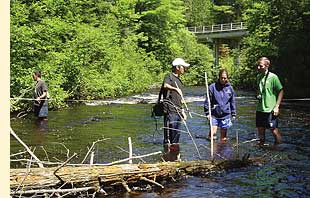Ecology Thrives at UGA
A Completely Different Experience
 Research conducted by graduate students at the Odum School of Ecology is diverse; their investigations range from vampire-bat behavior to the environmental benefits of green roofs.
Research conducted by graduate students at the Odum School of Ecology is diverse; their investigations range from vampire-bat behavior to the environmental benefits of green roofs.
In addition, observers regard the caliber of this research as outstanding. “The quality of graduate-student research is empirically seen in the kinds of offers our students are getting,” said graduate coordinator Ron Carroll. “They are often placed in high-level positions, academic and non-academic, in a variety of areas.” Besides professorships, alumni are employed as policy analysts, conservation directors, executives in nonprofit organizations (such as the National Food Alliance), and officers in government agencies (USAID).
The research of Ph.D. candidate John Kominoski, for example, addresses how changes in forest-tree-species composition are expected to affect river and riparian (related to river banks) ecosystems, which rely on leaf litter as a vital resource. This research is especially timely, as riparian forests in the Eastern United States are now experiencing dramatic changes in tree-species composition because of pressures from human development and insect infestations.
But quality and diversity of student research at the Odum School are not limited to graduate students—undergraduates are increasingly participating as well. “Our undergraduate students are building science credentials through research and they are even publishing journal articles,” said undergraduate coordinator Jim Richardson. “I have found that the majority are eager to participate in research, with many students being mentored by graduate students.”
Richardson said that 25 percent of the school’s undergraduates are currently participating in research, and that the faculty’s goal is to get virtually all of them involved. Consider senior Halley Ross. Under the guidance of graduate student mentor Will Duncan, she has studied how the Etowah River would be affected if many of its streams hosted reservoirs.
“I don’t think either of us were expecting to get significant results,” said Ross. “We were very mistaken, and in fact we were dumbstruck by how solid our results were. Streams with reservoirs had significantly smaller sediment size and significantly more algae than without.” In other words, she said, “reservoirs appear to have a much larger effect on streams that I would have suspected, and this does not bode well for the Etowah. I am hoping others will find this worrisome as well, and that more scientists will focus their efforts on this matter.”
Ross noted that participating in this project was dramatically different from other research experiences she has had. In her science classes she was accustomed to finishing experiments, which just scratched the surface, within a day or two. This independent research was a completely different experience, one that will likely be a highlight of her undergraduate years and possibly an influence on her career visions.
